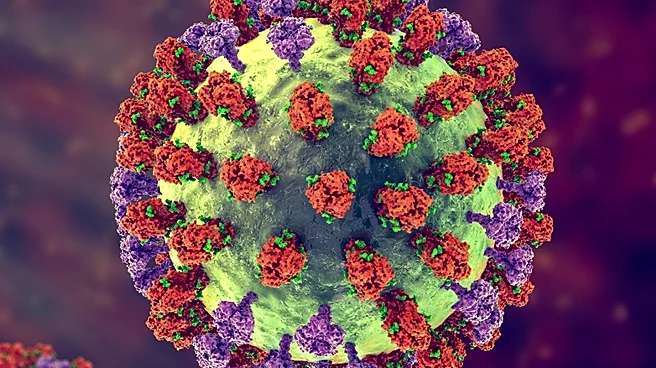What's Happening?
Recent developments in global health have highlighted the resurgence of Ebola in the Democratic Republic of Congo, where the country has faced nine outbreaks in the past decade. The ongoing crisis is exacerbated
by the ability of certain viruses, including Ebola, to hide within the human body in areas like the eyes and testes, beyond the reach of the immune system. This phenomenon allows viruses to linger undetected and potentially resurface, causing new infections. The Democratic Republic of Congo's experience with Ebola underscores the challenges posed by these hidden viruses, which can re-emerge from survivors and lead to new outbreaks. Researchers are focusing on understanding the biology of these viruses and the psychological impact on survivors, who often face stigma and fear.
Why It's Important?
The ability of viruses to hide within the human body and resurface poses significant challenges for global health efforts, particularly in regions like the Democratic Republic of Congo, which has been heavily impacted by Ebola. This phenomenon complicates efforts to eradicate the virus and prevent future outbreaks, as survivors can unknowingly carry and transmit the virus. The stigma and fear faced by survivors further hinder public health initiatives and community reintegration. Understanding and addressing these hidden viruses is crucial for developing effective treatments and preventive measures, which could have broader implications for managing other viral diseases with similar characteristics.
What's Next?
Researchers are actively investigating medications that can penetrate sanctuary sites within the body to eliminate hidden viruses. The use of small-molecule drugs, such as remdesivir, has shown promise in clearing the virus from survivors' bodies more quickly. Continued research and development of such treatments are essential to prevent the resurgence of viruses like Ebola. Additionally, public health campaigns focused on vaccination and community education are vital to reduce stigma and support survivors. These efforts aim to ensure that survivors can safely reintegrate into their communities without fear of transmitting the virus.
Beyond the Headlines
The ethical and psychological dimensions of hidden viruses are significant, as survivors face intense stigma and fear of transmitting the virus to loved ones. This stigma can lead to social isolation and hinder recovery efforts. Addressing these issues requires a comprehensive approach that includes psychological support, community education, and effective medical treatments. Long-term solutions must focus on eliminating the virus from survivors and reducing the risk of future outbreaks, which could transform global health strategies for managing viral diseases.










